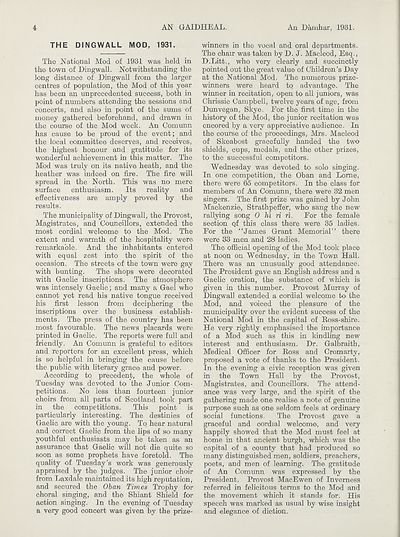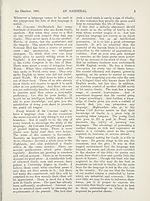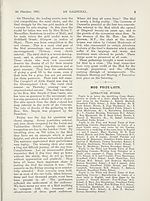Download files
Complete book:
Individual page:
Thumbnail gallery: Grid view | List view

4
AN GrAIDHEAL.
An Dkmhar, 1931.
THE DINGWALL MOD, 1931.
The National Mod of 1931 was held in
the town of Dingwall. Notwithstanding the
long distance of Dingwall from the larger
centres of population, the Mod of this year
has been an unprecedented success, both in
point of numbers attending the sessions and
concerts, and also in point of the sums of
money gathered beforehand, and drawn in
the course of the Mod week. An Comunn
has cause to be proud of the event; and
the local committee deserves, and receives,
the highest honour and gratitude for its
wonderful achievement in this matter. The
Mod was truly on its native heath, and the
heather was indeed on fire. The fire will
spread in the North. This was no mere
surface enthusiasm. Its reality and
effectiveness are amply proved by the
results.
The municipality of Dingwall, the Provost,
Magistrates, and Councillors, extended the
most cordial welcome to the Mod. The
extent and warmth of the hospitality were
remarkable. And the inhabitants entered
with equal zest into the spirit of the
occasion. The streets of the town were gay
with bunting. The shops were decorated
with Gaelic inscriptions. The atmosphere
was intensely Gaelic; and many a Gael who
cannot yet read his native tongue received
his first lesson from deciphering the
inscriptions over the business establish¬
ments. The press of the country has been
most favourable. The news placards were
printed in Gaelic. The reports were full and
friendly. An Comunn is grateful to editors
and reporters for an excellent press, which
is so helpful in bringing the cause before
the public with literary grace and power.
According to precedent, the whole of
Tuesday was devoted to the Junior Com¬
petitions. No less than fourteen junior
choirs from all parts of Scotland took part
in the competitions. This point is
particularly interesting. The destinies of
Gaelic are with the young. To hear natural
and correct Gaelic from the lips of so many
youthful enthusiasts may be taken as an
assurance that Gaelic will not die quite so
soon as some prophets have foretold. The
quality of Tuesday’s work was generously
appraised by the judges. The junior choir
from Laxdale maintained its high reputation,
and secured the Oban Times Trophy for
choral singing, and the Shiant Shield for
action singing. In the evening of Tuesday
a very good concert was given by the prize¬
winners in the vocal and oral departments.
The chair was taken by D. J. Macleod, Esq.,
D.Litt., who very clearly and succinctly
pointed out the great value of Children’s Day
at the National Mod. The numerous prize¬
winners were heard to advantage. The
winner in recitation, open to all juniors, was
Chrissie Campbell, twelve years of age, from
Dunvegan, Skye. For the first time in the
history of the Mod, the junior recitation was
encored by a very appreciative audience. In
the course of the proceedings, Mrs. Macleod
of Skeabost gracefully handed the two
shields, cups, medals, and the other prizes,
to the successful competitors.
Wednesday was devoted to solo singing.
In one competition, the Oban and Lome,
there were 65 competitors. In the class for
members of An Comunn, there were 32 men
singers. The first prize was gained by John
Mackenzie, StrathpeSer, who sang the new
rallying song 0 hi ri n. For the female
section qf this class there were 35 ladies.
For the “James Grant Memorial” there
were 33 men and 28 ladies.
The official opening of the Mod took place
at noon on Wednesday, in the Town Hall.
There was an unusually good attendance.
The President gave an English address and a
Gaelic oration, the substance of which is
given in this number. Provost Murray of
Dingwall extended a cordial welcome to the
Mod, and voiced the pleasure of the
municipality over the evident success of the
National Mod in the capital of Ross-shire.
He very rightly emphasised the importance
of a Mod such as this in kindling new
interest and enthusiasm. Dr. Galbraith,
Mfedical Officer for Ross and Cromarty,
proposed a vote of thanks to the President.
In the evening a civic reception was given
in the Town Hall by the Provost,
Magistrates, and Councillors. The attend¬
ance was very large, and the spirit of the
gathering made one realise a note of genuine
purpose such as one seldom feels at ordinary
social functions. The Provost gave a
graceful and cordial welcome, and very
happily showed that the Mod must feel at
home in that ancient burgh, which was the
capital of a county that had produced so
many distinguished men, soldiers, preachers,
poets, and men of learning. The gratitude
of An Comunn was expressed by the
President. Provost MacEwen of Inverness
referred in felicitous terms to the Mod and
the movement which it stands for. His
speech was marked as usual by wise insight
and elegance of diction.
AN GrAIDHEAL.
An Dkmhar, 1931.
THE DINGWALL MOD, 1931.
The National Mod of 1931 was held in
the town of Dingwall. Notwithstanding the
long distance of Dingwall from the larger
centres of population, the Mod of this year
has been an unprecedented success, both in
point of numbers attending the sessions and
concerts, and also in point of the sums of
money gathered beforehand, and drawn in
the course of the Mod week. An Comunn
has cause to be proud of the event; and
the local committee deserves, and receives,
the highest honour and gratitude for its
wonderful achievement in this matter. The
Mod was truly on its native heath, and the
heather was indeed on fire. The fire will
spread in the North. This was no mere
surface enthusiasm. Its reality and
effectiveness are amply proved by the
results.
The municipality of Dingwall, the Provost,
Magistrates, and Councillors, extended the
most cordial welcome to the Mod. The
extent and warmth of the hospitality were
remarkable. And the inhabitants entered
with equal zest into the spirit of the
occasion. The streets of the town were gay
with bunting. The shops were decorated
with Gaelic inscriptions. The atmosphere
was intensely Gaelic; and many a Gael who
cannot yet read his native tongue received
his first lesson from deciphering the
inscriptions over the business establish¬
ments. The press of the country has been
most favourable. The news placards were
printed in Gaelic. The reports were full and
friendly. An Comunn is grateful to editors
and reporters for an excellent press, which
is so helpful in bringing the cause before
the public with literary grace and power.
According to precedent, the whole of
Tuesday was devoted to the Junior Com¬
petitions. No less than fourteen junior
choirs from all parts of Scotland took part
in the competitions. This point is
particularly interesting. The destinies of
Gaelic are with the young. To hear natural
and correct Gaelic from the lips of so many
youthful enthusiasts may be taken as an
assurance that Gaelic will not die quite so
soon as some prophets have foretold. The
quality of Tuesday’s work was generously
appraised by the judges. The junior choir
from Laxdale maintained its high reputation,
and secured the Oban Times Trophy for
choral singing, and the Shiant Shield for
action singing. In the evening of Tuesday
a very good concert was given by the prize¬
winners in the vocal and oral departments.
The chair was taken by D. J. Macleod, Esq.,
D.Litt., who very clearly and succinctly
pointed out the great value of Children’s Day
at the National Mod. The numerous prize¬
winners were heard to advantage. The
winner in recitation, open to all juniors, was
Chrissie Campbell, twelve years of age, from
Dunvegan, Skye. For the first time in the
history of the Mod, the junior recitation was
encored by a very appreciative audience. In
the course of the proceedings, Mrs. Macleod
of Skeabost gracefully handed the two
shields, cups, medals, and the other prizes,
to the successful competitors.
Wednesday was devoted to solo singing.
In one competition, the Oban and Lome,
there were 65 competitors. In the class for
members of An Comunn, there were 32 men
singers. The first prize was gained by John
Mackenzie, StrathpeSer, who sang the new
rallying song 0 hi ri n. For the female
section qf this class there were 35 ladies.
For the “James Grant Memorial” there
were 33 men and 28 ladies.
The official opening of the Mod took place
at noon on Wednesday, in the Town Hall.
There was an unusually good attendance.
The President gave an English address and a
Gaelic oration, the substance of which is
given in this number. Provost Murray of
Dingwall extended a cordial welcome to the
Mod, and voiced the pleasure of the
municipality over the evident success of the
National Mod in the capital of Ross-shire.
He very rightly emphasised the importance
of a Mod such as this in kindling new
interest and enthusiasm. Dr. Galbraith,
Mfedical Officer for Ross and Cromarty,
proposed a vote of thanks to the President.
In the evening a civic reception was given
in the Town Hall by the Provost,
Magistrates, and Councillors. The attend¬
ance was very large, and the spirit of the
gathering made one realise a note of genuine
purpose such as one seldom feels at ordinary
social functions. The Provost gave a
graceful and cordial welcome, and very
happily showed that the Mod must feel at
home in that ancient burgh, which was the
capital of a county that had produced so
many distinguished men, soldiers, preachers,
poets, and men of learning. The gratitude
of An Comunn was expressed by the
President. Provost MacEwen of Inverness
referred in felicitous terms to the Mod and
the movement which it stands for. His
speech was marked as usual by wise insight
and elegance of diction.
Set display mode to:
![]() Universal Viewer |
Universal Viewer | ![]() Mirador |
Large image | Transcription
Mirador |
Large image | Transcription
| An Comunn Gàidhealach > An Comunn Gàidhealach Publications > Gaidheal > Volume 27, October 1931--September1932 > (12) Page 4 |
|---|
| Permanent URL | https://digital.nls.uk/125288568 |
|---|
| Description | This contains items published by An Comunn, which are not specifically Mòd-related. It includes journals, annual reports and corporate documents, policy statements, educational resources and published plays and literature. It is arranged alphabetically by title. |
|---|
| Description | A collection of over 400 items published by An Comunn Gàidhealach, the organisation which promotes Gaelic language and culture and organises the Royal National Mòd. Dating from 1891 up to the present day, the collection includes journals and newspapers, annual reports, educational materials, national Mòd programmes, published Mòd literature and music. |
|---|---|
| Additional NLS resources: |
|

